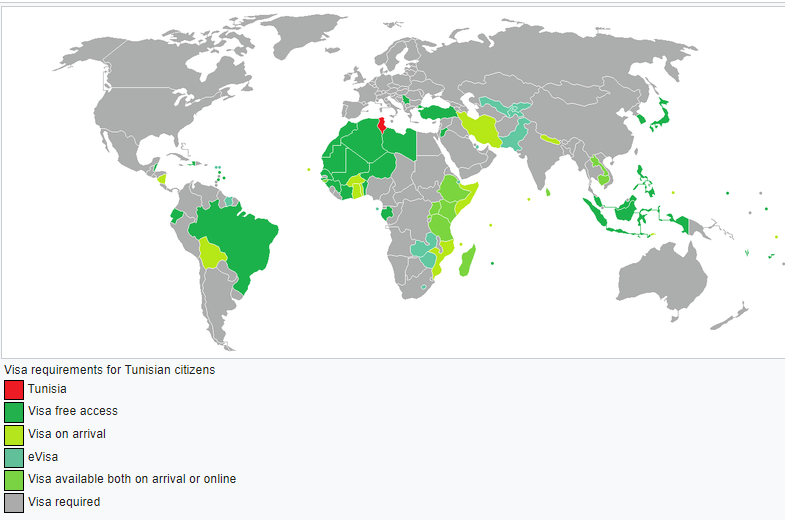Tunisia, the captivating North African destination, offers a myriad of experiences, from its Mediterranean coastline to the awe-inspiring Sahara Desert. Renowned for its historical sites, ancient ruins, and sun-kissed beaches, Tunisia welcomes over 8 million tourists annually. However, before planning your trip to this North African jewel, it's vital to determine whether you require a visa to visit Tunisia.

In this comprehensive guide, we explore Tunisia visa requirements, various visa types, application procedures, and a detailed list of countries whose citizens enjoy visa-free entry to Tunisia.
Tunisia's visa policy is determined by various factors, including your nationality, the purpose of your visit, and the duration of your stay. Here's what you need to know:
For travelers holding a valid residence permit issued by a Gulf Cooperation Council (GCC) member state, Tunisia offers a visa-on-arrival option. This visa allows a single-entry stay of up to 15 days. GCC countries include Bahrain, Kuwait, Oman, Qatar, Saudi Arabia, and the United Arab Emirates.
Visitors from approximately 150 countries, regardless of the purpose or duration of their stay, must apply for an embassy visa in advance. The application process involves scheduling an appointment at the nearest Tunisian embassy or consulate, completing the required application form, and presenting supporting documents. You must also pay an embassy visa fee. The approval process may take up to two weeks.
List here
The Tunisian government is working on implementing an online visa application system, known as the Tunisia eVisa. This electronic visa will simplify the application process for select nationalities, eliminating the need to visit an embassy or consulate in person.
Travelers will complete an online form with personal, passport, and travel information, answer security-related questions, and pay the eVisa fee. Once approved, the eVisa will be sent to the applicant via email. Keep an eye on official updates for details and the launch date of the Tunisia eVisa.
While many travelers must obtain a Tunisia visa before visiting, citizens of several countries are exempt from this requirement. They can explore Tunisia for up to 90 days without a visa. Here's the extensive list of countries whose citizens can enjoy visa-free travel to Tunisia:
Citizens from these countries can bypass Tunisia's tourist visa requirements if they are part of an organized tour and hold a hotel voucher:
Holders of diplomatic or service passports from the following countries are also exempt from Tunisia's short-stay visa requirements:
Please note that visa regulations can change, so it's essential to verify the latest information with the Tunisian embassy or consulate before planning your trip.
To apply for a Tunisia visa, you must ensure that you have all the necessary documents to support your application. These documents may include:
Begin your Tunisia Visa application process by accurately completing the Tunisia visa application form. Be sure to provide all the required information.
Your passport must be valid for at least six months and have been issued within the past ten years. It's crucial to check your passport's expiration date before applying.
Include a photocopy of the first page of your passport, which contains your personal information.
Typically, you'll need 1 or 2 passport-size photos, adhering to specific specifications:
Provide evidence of your accommodation in Tunisia, which can be in the form of a hotel reservation or another type of tourist accommodation.
If you have a host in Tunisia, you may need a letter of invitation from them, specifying the purpose and duration of your visit.
Your travel itinerary should include details such as travel tickets, accommodation reservations, and dates of travel and departure.
Depending on the purpose of your visit, you may need additional documents. For example, if you are traveling for business, you may require a business letter. Always check the specific requirements based on your travel intentions.
Ensure that you provide proof of payment for the Tunisia visa fee, adhering to the embassy or consulate's specifications.
Please be aware that these Tunisia visa requirements can vary based on your country of origin, the purpose of your visit, and the duration of your stay. The Tunisian authorities handling your visa application may also request additional documents as they see fit.
As of the current regulations, the primary way to apply for a Tunisia visa is by visiting a Tunisian consulate or embassy. The application process typically involves the following steps:

Locate the Tunisian consulate or embassy in your home country. If there is no Tunisian diplomatic mission in your country, you may need to contact the nearest one, even if it's in a neighboring country. Alternatively, you can apply directly to the Direction Générale de la Sécurité Nationale in Tunis, the capital of Tunisia.
Explore the official website of the Tunisian embassy or consulate to find detailed information about visa requirements and the application process. Some diplomatic missions may also offer the option to make an online appointment, streamlining the application process.
Gather all the necessary documents as per the Tunisia visa requirements and submit them along with your application at the embassy or consulate. Ensure that you have filled out the Tunisia visa application form accurately.
The processing time for a Tunisia visa can vary, so be prepared to wait anywhere from 5 to 20 business days or more, depending on your country, consulate or embassy, and the completeness of your application. If additional authorizations from the Tunisian home office are required, the processing time may be longer.
As such, it's advisable to apply for a Tunisia visa about a month before your intended travel date and inquire about the processing time when submitting your application.
Tunisia visa fees are not standardized and can vary based on your country of residence and the specific embassy or consulate you are applying to. Some embassies may require bank transfers for payment, while others may accept cash.
After the implementation of the Tunisia online visa, you will likely have the option to pay the visa fee online at the time of application. To determine the exact Tunisia visa fee for your country of residence, it's essential to contact the consulate or embassy where you are applying.
A Tunisian tourist visa is generally issued for a maximum duration of 90 days, although shorter durations may be granted depending on your specific travel purpose or itinerary. If you plan to stay in Tunisia for longer than 90 consecutive days or for more than six months in a year, you must apply for a Tunisia long-stay visa and obtain a temporary residence permit.
There are two main types of Tunisian visas:
There are two types of Tunisian residence permits:
US citizens can visit Tunisia for up to 90 days without a visa. However, if you plan to stay longer or are residing in the US temporarily, you will need to apply for a Tunisia visa at a Tunisian embassy or consulate, unless you have a US B1/B2 visa. If you intend to stay in Tunisia for more than 90 days, you will need a Tunisia long-stay visa and a residence permit.
Do I need a visa to visit Tunisia?
It depends on your nationality. Tunisia offers visa-free travel to citizens of some countries, while others require a visa. Check the list of visa-exempt countries and Tunisia's embassy or consulate for your specific requirements.
What is the maximum duration of a visa-free stay in Tunisia?
Visa-free stays in Tunisia vary based on nationality, ranging from 30 to 120 days. Check with the Tunisian embassy or consulate for precise details.
Can I apply for a Tunisia visa online?
Currently, the only way to obtain a Tunisia visa is through a Tunisian embassy or consulate. However, Tunisia is working on implementing an online visa application system known as the Tunisia eVisa, which will simplify the process for select nationalities.
How long does it take to process a Tunisia visa?
The processing time for a Tunisia visa can vary, typically taking between 5 to 20 business days or more. Ensure you apply at least a month before your intended travel date.
What are the fees for a Tunisia visa?
Tunisia visa fees are not standardized and can differ based on your country of residence and the specific embassy or consulate you apply to. Contact the embassy or consulate for precise fee details.
What types of visas are available for Tunisia?
Tunisia offers two primary visa types: short-stay visas, valid for up to 90 days, and long-stay visas, required for stays exceeding 90 days or longer than six months in a year.
Can I extend my stay in Tunisia if my visa is about to expire?
For extended stays, you must apply for a Tunisia long-stay visa and a residence permit. It's essential to do this well in advance before your visa expires.
Do US citizens need a visa for Tunisia?
US citizens can visit Tunisia for up to 90 days without a visa. However, for longer stays, a Tunisia long-stay visa and residence permit are required.
What are the requirements for a Tunisia visa application?
Requirements may vary based on your nationality, purpose of travel, and length of stay. Typically, you'll need a visa application form, a valid passport, passport-size photos, proof of accommodation, a letter of invitation, a travel itinerary, and proof of paid visa fees. Additional documents may be required depending on your specific circumstances.
Can I travel to Tunisia for work or study without a visa?
Generally, you'll need to apply for a visa if your purpose of travel is work, study, or residency. Visa exemptions typically apply to tourism visits.
What is the validity of a Tunisia visa?
Tunisia tourist visas are issued for a maximum of 90 days but can be issued for a shorter duration based on your travel purpose and itinerary.

To help us improve